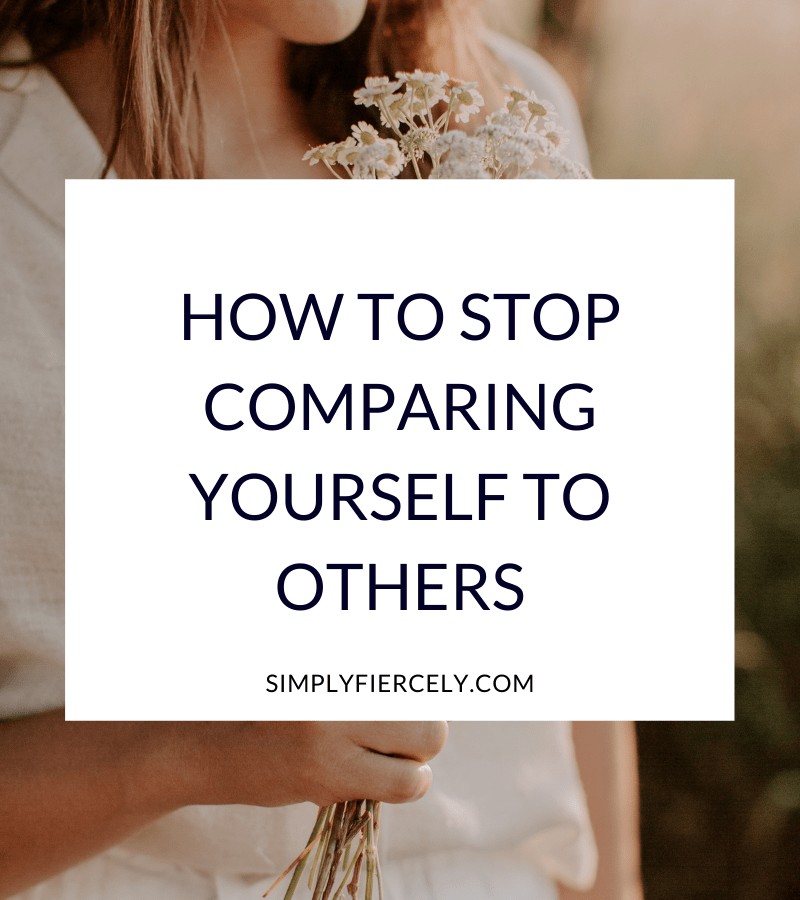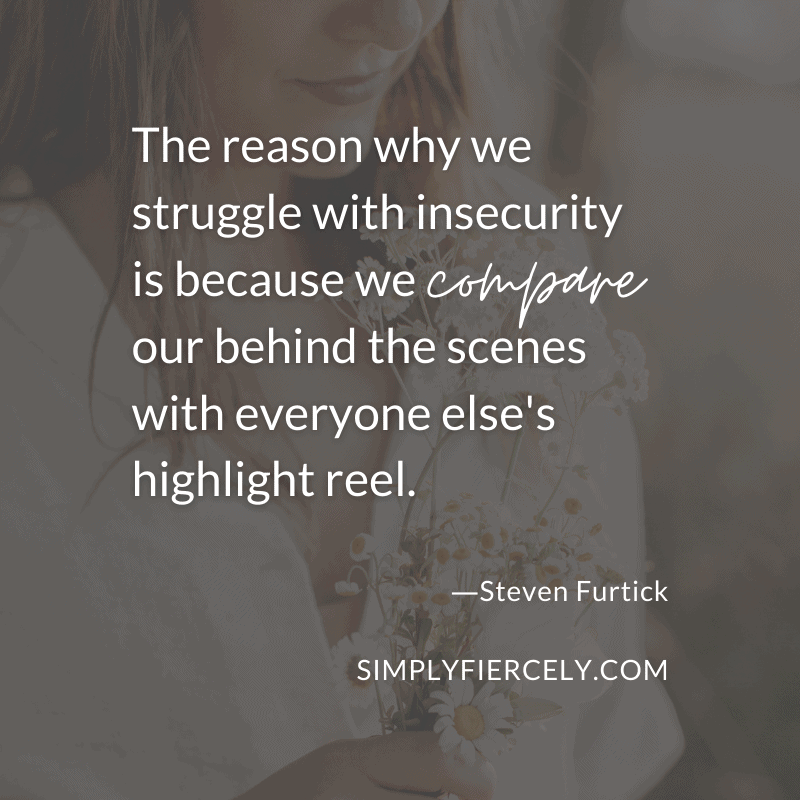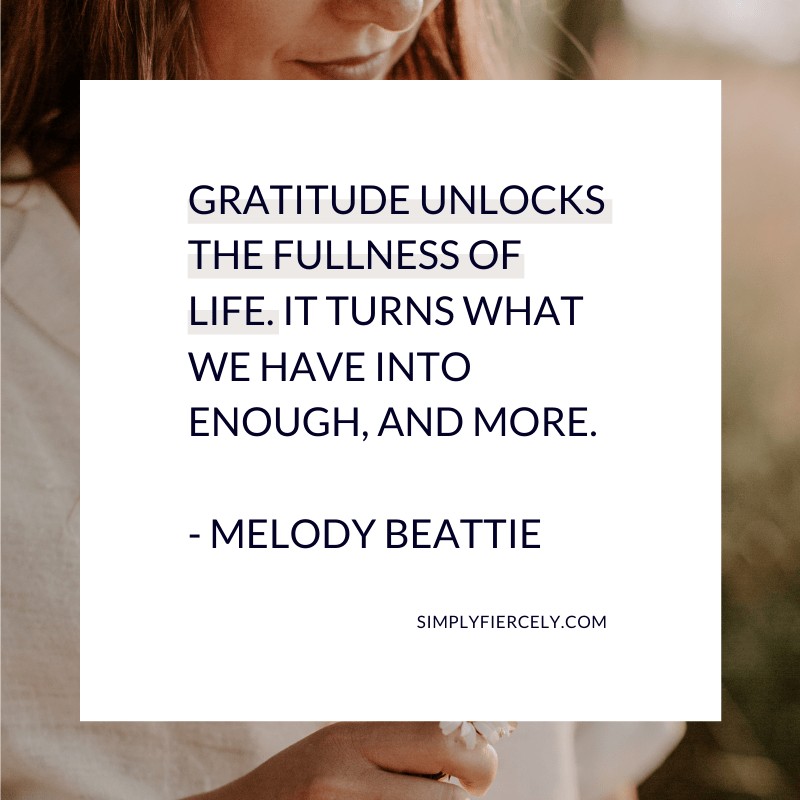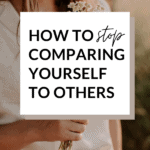It’s hard to live an intentional life when you always judge yourself by other people’s standards. Here are five ways to stop comparing yourself to others so you can find joy in being your unique self.
Over the years, I’ve spent far too long struggling with unhealthy comparisons.
It began early. As a young girl, I’d look in the mirror at my dark hair and almond eyes, and wonder why I didn’t look like the other kids at school.
It left me uncomfortable in my own skin, a feeling that only intensified over the years. As I got older, there was so much more to worry about—my car, my career, my home, and even my relationships.
I couldn’t stop measuring my life against others, and somehow I always came up short.
The result was a deep sense of “not-enoughness” that stayed with me until my early thirties. It was only then that I learned to stop comparing myself to others. Instead, I began to turn my attention inwards, using my own dreams and values as a measuring stick for success.
I’m not perfect and I still struggle at times, but it was the start of a subtle shift on my journey to live life to the fullest. Here are some of the lessons I’ve learned along the way.

This post contains affiliate links, which means I recommend products and make a small commission on purchases at no additional cost to you. Click here for the full disclosure statement.
The Problem With Comparisons
“Too many people spend money they haven’t earned, to buy things they don’t want, to impress people that they don’t like.” — Will Rogers
When you spend too long comparing your life to others, it can cause many problems. As a minimalist and a reformed shopaholic, the first that comes to mind is an excess of “stuff”.
In my twenties, I was obsessed with fashion blogs. I would spend hours admiring the photos, desperately wishing I could be beautiful and carefree, like the women I saw online.
I wanted to be anyone but myself, so I shopped accordingly. I thought the right outfit or a new pair of shoes would transform me—but of course, it was all an illusion.
More clothes only led to more clutter, more debt and more stress. I was stuck in a cycle, fueled by constant comparisons with strangers on the Internet.
Related Post: The Long Road to Self Acceptance

Unfortunately, in retrospect, my overflowing closet (and shrinking bank account) were relatively minor issues. The real problem with constant comparing is that it led to wasting years of my life, spent chasing other people’s dreams instead of my own.
A promotion, a new car, a new home—check, check, check.
To be clear, there’s nothing wrong with wanting these things but your motivation matters. I never thought about what I needed to be happy. Instead, I blindly followed those around me and focused on ticking boxes to keep up.
Is it any surprise that I ended up feeling hopelessly lost?
Ultimately, this is the real problem with comparing yourself to others. It muddies the waters and you lose clarity, to the point where you’re not sure what really matters anymore.
Related Post: An Intro to Intentional Living: 7 Things You Need to Know
How to Stop Comparing
If you want to live an authentic life, one true to yourself and your values, then here are five strategies that will help you stop comparing yourself to others.
ACKNOWLEDGE THE TRADEOFFS
Start by creating the habit of naming tradeoffs. Try using this statement as a guide:
“He might have ___, but he probably had to give up ___ to have it.”
This isn’t about passing judgement. Instead, it’s about creating awareness. Often we want what someone else has, but we don’t want to make the same sacrifices. Or we genuinely want the same thing, but we gloss over the hard work that’s required to achieve it.
Either way, acknowledging the tradeoffs will often help you gain a new perspective.
For example, I might admire a friend’s new car—but when I acknowledge the work (or perhaps debt) that went into it, I realise it’s not in alignment with my priorities. Instead of feeling bad about my older car, I feel content because it reflects my desire to live debt-free.
WRITE YOUR OWN DEFINITION OF SUCCESS
Another tip that will help you if you’re struggling with comparisons is to get clear about your values and priorities. Don’t assume you know the answer. Instead, get out a pen and paper, and write it all down.
Again, this is helpful because it creates perspective and clarity. When you decide what matters, you’re effectively deciding what doesn’t matter as well.
Do you struggle to answer the question, “What matters?” If so, I invite you to join Values + Vision. This self-paced online course will take you on a deep dive into your values and show you how to live in alignment with what matters most.
KNOW YOUR TRIGGERS
So far, the first two suggestions have been about reframing comparisons—how can you looking at things from a new angle, so that they have less power over you?
I certainly believe these are powerful tools but I’m mindful that sometimes, it’s better to avoid comparisons altogether. After all, we can’t always use logic to combat our feelings.
For example, I already mentioned that I used to struggle a lot with my appearance. I struggled for years to feel comfortable with what I saw in the mirror and my obsession with fashion blogs and magazines certainly didn’t help.
Even though my brain knew that those images are highly edited, my heart still struggled. I knew it wasn’t good for my wellbeing, so I made the decision to stop consuming fashion content and I’ve never regretted my choice.

Of course, it’s not always an all or nothing. In fact, I think it’s usually a case of being mindful of our feelings and recognising when it’s time to create boundaries.
For example, I really enjoy a handful of parenting accounts that I follow on Instagram. Most days, they inspire me to be a better mum and I love learning about creative ways to play.
But if I’m honest, there are some days when these accounts bring me down. I look at their smiling faces and picture perfect playrooms, and I feel like I’m failing as a parent.
When this happens, I know it’s a sign that I need a break. Sometimes spaces that we enjoy can become toxic when we’re not feeling our best, and when this happens it’s OK to walk away for a while. This can applies online and in real-life communities too.
Pay attention to your feelings and if you feel triggered, make time for rest.
Related Post: A Minimalist’s Guide to Using Social Media Wisely + Mindfully
PRACTICE GRATITUDE
“Gratitude unlocks the fullness of life. It turns what we have into enough, and more.”
— Melody Beattie
I don’t think that comparing yourself to others is inherently a bad thing. Sometimes, comparisons can lead to inspiration or possibly even healthy competition.
The problem is when you’re coming from a position of lack. You feel like you’re not good enough (or like you don’t have enough) and comparisons validate these feelings. It’s a cycle that can quickly spiral out of control, if you’re not careful.
One way to put a stop to it is to practice gratitude. When you appreciate what you already have, life feels joyful and abundant. We can admire and celebrate with others because we know that we already have more than enough.

DEVELOP YOUR SELF-WORTH
A final strategy that goes hand in hand with gratitude is increasing your self-worth. This is about going the extra mile beyond feeling like you HAVE enough to knowing that you ARE enough.
I’ve written before about my struggles with self-worth and I must admit that it’s an ongoing process. I continue to learn and un-learn, letting go of limiting beliefs and creating new, more supportive ones.
If this is something you struggle with too, then I’d like to recommend a few books that have had a great impact on my life:
- Emotional Agility: Get Unstuck, Embrace Change, and Thrive in Work and Life by Susan David — I cannot recommend this book enough. My personal copy has been extensively highlighted and it’s covered in notes! (I also recommend her Ted Talk, if you want a preview of her work.)
- Daring Greatly: How the Courage to Be Vulnerable Transforms the Way We Live, Love, Parent, and Lead by Brené Brown — This book is all about engaging in life from a place of “worthiness” and it created SO many “ah-ha” moments for me. (Brené Brown also has a Ted Talk that I recommend, as well as a Netflix show “The Call to Courage).
- If you enjoy journaling, I always recommend Today I Affirm: A Journal that Nurtures Self-Care by Alexandra Elle. I love how she encourages us to focus on the duality of life—this is a beautiful example.
How To Live To The Fullest: More Resources
If you found this post helpful, you might also enjoy:
- How To Get Your Life Together When You Feel Out Of Control
- 4 Ways to Stop Letting the Little Things Bother You
- When Life Gets Hard: 6 Things Your Soul Needs to Hear
Want to “kick-start” your simple and intentional living journey? 7 Simple Days is a short online program that will help you find clarity and purpose. Click here to learn more!
What strategies do you use to stop comparing yourself to others? Or did you find any of these helpful? Let us know in the comments!


Thank you for your transparency and these insight helps. I appreciate your blogs- your openness in sharing, your great ideas, and the resources you recommend.
Hi!
This post has fed my soul in so many ways. It’s sad how society has created a system makes us compare and feed off of unhealthy competition. I especially like your points about setting our own definition of success, learning our triggers and practicing gratitude. These are all true things I need to implement daily in my life.
Thank you for sharing such wonderful insight!
Thank you so much for your kind words, Merveille! Take care x